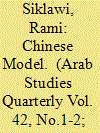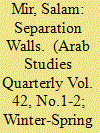|
|
|
Sort Order |
|
|
|
Items / Page
|
|
|
|
|
|
|
| Srl | Item |
| 1 |
ID:
174437


|
|
|
|
|
| Summary/Abstract |
This article is a reflection of the author's research visit to China in November 2019. It examines the growth and development of China and how this Chinese growth has challenged and reduced the US hegemony and supremacy in the world nowadays.
|
|
|
|
|
|
|
|
|
|
|
|
|
|
|
|
| 2 |
ID:
174433


|
|
|
|
|
| Summary/Abstract |
Starting in the 1970s neoliberalism began to undermine and chisel away at liberalism, taking aim at the social wage. By the twenty-first century this had resulted in a structural crisis of overaccumulation and a political crisis of legitimacy as social dislocation and precarity became prevalent. The war in Iraq created through war and reconstruction new spaces for accumulation. The invasion and occupation were premised on and worked to maintain anti-Muslim racism in order to scaffold legitimacy for a neoliberal state that is hollowed out of its previous liberal promises. No longer offering a social wage, this becomes the affective wages of neoliberalism, premised on the reification of ontological difference between a civilized, humane and rational West, and a fundamentally illiberal Muslim other. At the same time that liberalism is eroded by neoliberalism, the latter draws from and reinforces the liberal logic of deflection manifest in frontier logics.
|
|
|
|
|
|
|
|
|
|
|
|
|
|
|
|
| 3 |
ID:
174432


|
|
|
|
|
| Summary/Abstract |
This article provides an assessment of three decades of US hegemony over the Arab-majority states of the Middle East's Gulf region. Since its direct military intervention in the 1990 war over Kuwait, the US increasingly engaged itself as an architect forging the region through deployment of its neoliberal economic and financial coercion, Janus-faced support for authoritarian regimes while promoting democracy, human rights and individual freedom rhetorically, as well as repeated direct military interventions into Arab states in an effort to bring about regime change. At the base of diplomatic and public justification for the 1990–91 intervention—or the Gulf War as it became known to Americans—was the assertion that the war was defensive in nature, protecting the territorial integrity of Kuwait as well as the enshrining the norms of non-intervention and the sanctity of borders. Over the following years, however, US military forces came to be active in Iraq, Syria, Yemen and Libya with an expanded coterie of bases littered across the states of the Gulf (Saudi Arabia, Kuwait, Bahrain, Qatar, UAE and Oman). While the US and its allies had been engaged in the region's politics throughout the Cold War, from 1990 through 2019, the US escalated its role to preside over regional politics through a hub-and-spoke latticework of relations between itself and regional states. From the perspective of nearly three decades since 1990, an appraisal of this coercive relationship, focusing on the humanitarian impacts it has wrought upon the region's peoples, suggests it has failed according to these criteria. Many of the region's peoples have experienced a marked decline in their economic well-being, personal safety and health, while the state apparatuses established following the retreat of European imperialism now lie in ruin in Iraq, Libya, Syria and Yemen. The populations of these states now face a precarious future, without the protection of state institutions, against a range of predatory actors. Moreover, these actions have contributed toward the decline of US global influence, thereby encouraging further change in an environment where popular sovereignty and inputs into governance by regional peoples has been frustrated through the exercise of US power.
|
|
|
|
|
|
|
|
|
|
|
|
|
|
|
|
| 4 |
ID:
174436


|
|
|
| 5 |
ID:
174435


|
|
|
|
|
| Summary/Abstract |
This article analyzes regional events in the twenty-first century and identifies Turkey's relations with Arab countries, pointing out the serious deterioration that has occurred in those relations with its bordering Arab neighbors as well as Egypt and Lebanon. The article argues that Turkey's “imperatives of state,” as in the case of any other state actor, determine the foreign policy trajectory and consequently its regional and international relations. Turkey has chosen to ally itself with pro-Western regional states, namely Israel and Qatar, but not others, such as Egypt. Creating rivalry and animosity with bordering states is neither conducive to Turkey's long-term relations with those states nor to its ultimate political stability. Its NATO membership exacerbates animosity that would ultimately work against Turkey's regional influence. Consequently, Turkey's imperatives of state ironically stand in the way of achieving its regional ambitions.
|
|
|
|
|
|
|
|
|
|
|
|
|
|
|
|
| 6 |
ID:
174431


|
|
|
|
|
| Summary/Abstract |
Using critical textual analysis based on the postcolonial school of thought, this essay analyzed a ten-minute segment, called “Women of the Revolution,” on the ABC news program This Week, anchored at that time by Christiane Amanpour, for its portrayals of Arab and Muslim women. The analysis showed that Arab and Muslim women were portrayed positively only when they fit a “media-darling” trope of Western-educated Arab or Muslim women, or those who looked and acted similar to Western women, especially if they ascribed to a Western view of feminism. Those women also were seen as the exception to the “repressive” culture that characterizes the Arab and Muslim worlds, according to the Orientalist stereotype. The implications of this analysis indicate that, in spite of the visibility and progress of many Arab and Muslim women in their countries and indigenous cultures, they are still framed within old recycled molds in US mainstream media, even if these seem positive at face value.
|
|
|
|
|
|
|
|
|
|
|
|
|
|
|
|
| 7 |
ID:
174434


|
|
|
|
|
| Summary/Abstract |
This critical set of reflections addresses how the increasing visibility of the Palestinian struggle and the growing attention to Palestine in the (US) academy coincides with altered and depleted meanings for terms and concepts once central to a Palestinian liberation framework. The authors challenge the de-familiarization of the Palestinian political lexicon by ruminating on past, present and potential future meanings for words whose currency, they argue, has assumed a deceptively simple valuation. What are the unforeseen political consequences of visibility, of “incorporation,” and how might these be resisted within the arena of meaning and through the process of reviving language as an instrument of national liberation struggle? Revisiting old definitions of terms and contributing thoughts to the value of words such as Zionism, peace process and negotiations, statehood and violence, the authors contest the boundaries of disciplinary research in service of Palestinian liberation.
|
|
|
|
|
|
|
|
|
|
|
|
|
|
|
|
|
|
|
|
|